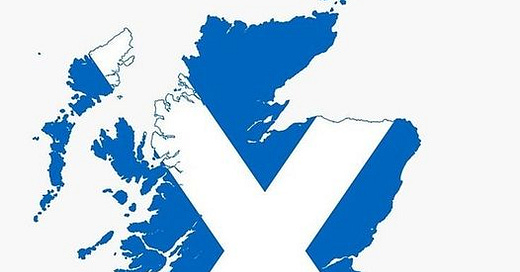🏴 Scotland’s Land, Westminster’s Legacy: Who Really Owns Our Country?
Article 19 of the Facts vs Fiction series: Land Equals Power—So Who Holds It?
They say land is power. If that’s true, then Scotland should ask:
Who really controls the land beneath our feet?
Here’s a clue:
👉 More than half of Scotland’s land is owned by just 432 people.
That’s not a typo—it’s a democratic scandal.
Scotland’s land isn’t owned by its people—it’s dominated by a tiny elite, shaped by centuries of aristocracy, imperial policies, and Westminster’s protection of monopoly ownership.
Let’s pull back the curtain on Scotland’s land inequality, how we got here, and what full land reform could achieve for the nation’s future.
The Great Land Grab: A Legacy of Empire and Aristocracy
Scotland’s land ownership map was drawn by conquest, colonialism, and capitalism—not democracy.
For centuries, land ownership in Scotland has been hoarded, fenced off, and legally protected by the ruling elite:
Feudal rule entrenched aristocratic landholding for centuries, ensuring that power stayed within elite families.
The Highland Clearances violently displaced entire communities, forcing thousands into exile while leaving land open for private estates and hunting grounds.
UK property laws have continually protected large landowners, reinforcing inequality instead of redistributing land.
By the time the Scottish Parliament was established in 1999, Scotland had already endured 1,500 years of privately concentrated landholding—untouched by any UK government willing to reform it.
The Numbers That Should Make You Angry
Scotland’s land inequality is among the worst in the Western world—and the statistics prove it.
Who Owns Scotland?
📌 Scotland has 16 million acres of land
📌 432 private landowners control over 8 million acres
📌 Just 10 estates own more land than all of Scotland’s community trusts combined
📌 The Duke of Buccleuch alone owns more land than some entire countries
And here’s the most troubling trend:
📌 Foreign investors and absentee landlords are buying more of Scotland’s land every year, often using corporate loopholes to avoid taxation or public scrutiny.
👉 Scotland—a nation of 5.4 million people—is essentially rented out to a handful of elites and corporations, many of whom don’t live in Scotland and don’t pay full taxes.
How Westminster Enabled This
Successive UK governments actively protected elite landholding, blocking meaningful reform in Scotland.
Westminster’s Role in Land Monopoly
❌ Refused to end feudal land ownership until Scotland’s Parliament pushed for reform
❌ Created tax havens and loopholes for offshore landowners, shielding estates from proper taxation
❌ Allowed corporate shell companies to buy land anonymously, making ownership untraceable
❌ Prioritized grouse moors over housing, farming, and community use, ensuring land remained in private hands rather than serving public needs
Despite Westminster’s claims of economic fairness, Scotland remains trapped in a system of inherited privilege, where land serves wealth—not people.
And yet, we’re told we can’t govern ourselves?
Land Reform: A Slow, Half-Measured Struggle
The Scottish Parliament has made some progress—but without full fiscal control, land reform remains limited.
Scottish Achievements in Land Reform
✅ Ended feudal tenure, breaking centuries of aristocratic control
✅ Created community right-to-buy schemes, allowing local groups to reclaim small portions of land
✅ Established the Scottish Land Fund, providing resources for community-led land purchases
But here’s the fundamental issue:
👉 Land reform without full fiscal control is like mopping the floor while the ceiling leaks.
Without independence, Scotland can’t:
❌ Enforce proper land taxation, ensuring land serves local communities instead of offshore investors
❌ Restrict foreign land grabs, preventing corporations from accumulating vast estates under tax loopholes
❌ Break up land monopolies, ensuring that Scotland’s natural resources actually belong to its people
👉 Without sovereignty over taxation and land policies, Scotland remains locked in Westminster’s framework of elite land control.
Why Land Matters
This isn’t just about ownership titles—it’s about economic power, sustainability, and human dignity.
Land Is the Foundation of National Wealth
🏠 Where homes are built—Affordable housing depends on land access and regulation
🌾 Where food is grown—Agriculture and food sovereignty require land reform to support farmers
⚡ Where energy is produced—Renewable energy development needs sustainable land management
🏘️ Where communities live or die—Land inequality dictates whether local economies thrive or collapse
Ownership of land equals control over wealth, housing, jobs, and sustainability.
Without land reform, Scotland will always be held hostage by the few at the cost of the many.
What An Independent Scotland Could Do
With full control, Scotland could deliver real land reform—not just symbolic gestures.
Key Land Reform Strategies Scotland Could Enact
✅ Introduce a Land Value Tax, penalizing hoarding while encouraging fair land use
✅ Cap private land ownership, ensuring communities—not monopolies—dictate land access
✅ Ban offshore and anonymous landownership, preventing foreign corporations from seizing Scottish land
✅ Prioritize housing, food systems, and energy sovereignty, ensuring land serves people instead of profit-driven estates
✅ Build a land reform model based on sustainability and equity, ensuring future generations benefit from fair land distribution
👉 Independence isn’t just about governance—it’s about reclaiming Scotland’s physical foundation.
Conclusion: Take Back the Ground Beneath Our Feet
Scotland doesn’t just need independence—it needs reclamation.
Scotland’s land should not be controlled by the privileged few—it should be a public resource that supports the entire nation.
This isn’t just about historical injustice—it’s about dignity, equity, and national prosperity.
👉 Breaking free from Westminster’s economic grip isn’t just about self-governance—it’s about finally breaking Scotland’s feudal past and ensuring the land serves the people, not the elite.
Independence means taking back the ground beneath our feet—and securing Scotland’s future from the roots up.





